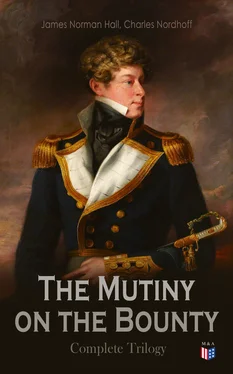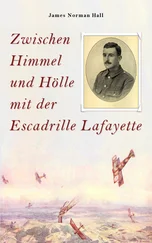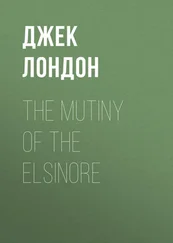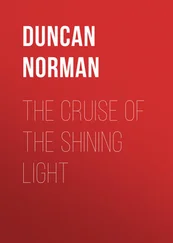“Have we been attacked, Churchill?” I asked; for my first thought was that the Bounty must have drifted close to one of the islands thereabout, and that we had been boarded by the savages.
“Put on your clothes and lose no time about it, Mr. Byam,” he replied. “We have taken the ship and Captain Bligh is a prisoner.”
Aroused suddenly from the deepest slumber, I did not even then grasp the meaning of what he said, and for a moment sat gazing stupidly at him.
“They’ve mutinied, Byam!” said Stewart. “Good God. Churchill! Are you mad? Have you any conception of what you’re doing?”
“We know very well what we’re doing,” he replied. “Bligh has brought all this on himself. Now, by God, we’ll make him suffer!”
Thompson shook his musket in menacing fashion. “We’re going to shoot the dog!” he said; “and don’t you try any of your young gentlemen’s tricks on us, or we murder some more of you! Seize ’em up, Churchill! They’re not to be trusted.”
“Hold your tongue and mind the arms chest,” Churchill replied. “Come, Mr. Byam, hurry into your clothes. Quintal, stand fast by the door there! No one’s to come forward without my orders—understand?”
“Aye, aye, sir!”
Turning my head, I saw Matthew Quintal at the rear entrance to the berth. Even as I looked, Samuel appeared behind him, dressed only in his trousers, his thin hair standing awry and his pale face considerably paler than its wont. “Mr. Churchill!” he called.
“Go back, you fat swine, or I run you through the guts!” Quintal shouted.
“Mr. Churchill, sir! Allow me to speak to you,” Samuel called again.
“Drive him back,” Churchill said, and Quintal made so fierce a gesture with his musket that Samuel vanished without waiting to hear more. “Give him a prod in the backside, Quintal,” someone shouted, and, looking up, I saw two more armed men leaning over the hatchway.
Without weapons of any sort, there was nothing that Stewart and I could do but obey Churchill’s orders. Both he and Thompson were powerful men and we should have been no match for them even had they been unarmed. I immediately thought of Christian, a man as quick in action as in decision, but I knew there could be no hope of his still being at liberty. He was the officer of the morning watch and had doubtless been rushed and overwhelmed at the very outset of the mutiny, even before Bligh had been secured. Catching my eye, Stewart shook his head slightly, as much as to say, “It’s useless. There’s nothing to be done.”
We dressed in short order, and Churchill then ordered us to precede him along the passage to the fore ladderway. “Keep the others in the berth, Thompson,” he called back. “Leave ’em to me; I’ll mind ’em!” Thompson replied. There were several armed guards at the fore-hatch, among them Alexander Smith, my hammock man, whose loyalty in whatever situation I should have thought unquestionable. It was a shock to see him in Churchill’s party, but the scene that presented itself as we came on deck made me forget the very existence of Smith.
Captain Bligh, naked except for his shirt, and with his hands tied behind his back, was standing by the mizzenmast. Christian stood before him, holding in one hand the end of the line by which Bligh was bound and in the other a bayonet, and around them were several of the able seamen, fully armed, among whom I recognized John Mills, Isaac Martin, Richard Skinner, and Thomas Burkitt. Churchill then said to us, “Stand by here. We mean no harm to either of you unless you take part against us.” He then left us.
Stewart and I had taken it for granted that Churchill was the ringleader of the mutineers. As already related, after his attempted desertion at Tahiti he had been severely punished by Bligh. I knew how deeply he hated him, and it was conceivable that such a man could goad himself even to the point of mutiny. But that Christian could have done so, no matter what the provocation, was beyond anything I could have dreamed of as possible. Stewart’s only comment was, “Christian! Good God! Then there’s no hope.”
The situation looked hopeless indeed. At this time the only unarmed men I saw on deck were Captain Bligh and ourselves. The ship was entirely in the hands of the mutineers. Evidently we had been brought up to divide the party of midshipmen below, thus preventing any opportunity for our taking concerted action. In the confusion we made our way aft a little way, and as we approached the spot where Bligh was standing, I heard Christian say, “Will you hold your tongue, sir, or shall I force you to hold it? I’m master of this ship now, and, by God, I stand no more of your abuse!” Sweat was pouring down Bligh’s face. He had been making a great outcry, shouting, “Murder! Treason!” at the top of his voice.
“Master of my ship, you mutinous dog!” he yelled. “I’ll see you hung! I’ll have you flogged to ribbons! I’ll....”
“Mamu, sir! Hold your tongue or you are dead this instant!”
Christian placed the point of his bayonet at Bligh’s throat with a look in his eye there was no mistaking. “Slit the dog’s gullet!” someone shouted; and there were cries of “Let him have it, Mr. Christian!” “Throw him overboard!” “Feed the bastard to the sharks!” and the like. It was only then, I think, that Captain Bligh realized his true situation. He stood for a moment breathing hard, looking about him with an expression of incredulity on his face.
“Mr. Christian, allow me to speak!” he begged hoarsely. “Think what you do! Release me—lay aside your arms! Let us be friends again, and I give you my word that nothing more shall be said of this matter.”
“Your word is of no value, sir,” Christian replied. “Had you been a man of honour things would never have come to this pass.”
“What do you mean to do with me?”
“Shoot you, you bloody rogue!” cried Burkitt, shaking his musket at him.
“Shooting’s too good for him! Seize him up at the gratings, Mr. Christian! Give us a chance at him with the cat!”
“That’s it! Seize him up! Give him a taste of his own poison!”
“Flay the hide off him!”
“Silence!” Christian called, sternly; and then, to Bligh: “We’ll give you justice, sir, which is more than you have ever given us. We’ll take you in irons to England....”
A dozen protesting voices interrupted him.
“To England? Never! We won’t have it, Mr. Christian!”
Immediately the deck was again in an uproar, all the mutineers clamouring against Christian’s proposal. Never was the situation with respect to Bligh so critical as at that moment, and it was to his credit that he showed no sign of flinching. The men were in a savage mood, and it was touch and go as to whether he would be shot where he stood; but he glared at each of them in turn as though challenging them to do so. Luckily a diversion was created when Ellison came dashing up flourishing a bayonet. There was no real harm in this lad, but he loved mischief better than his dinner, and, being thoughtless and high-spirited, he could be counted upon to get himself into trouble whenever the opportunity presented itself. Evidently he considered joining in a mutiny nothing more than a fine lark, and he now came dancing up to Bligh with such a comical expression upon his face that the tension was relieved at once. The men broke into cheers. “Hooray, Tommy! Are you with us, lad?”
“Let me guard him, Mr. Christian!” he cried. “I’ll watch him like a cat!” He skipped up and down in front of Bligh, brandishing his weapon. “Oh, you rogue! You old villain! You’d flog us, would you? You’d stop our grog, would you? You’d make us eat grass, would you?”
The men cheered him wildly. “Lay on, lad!” they shouted. “We back you! Give him a jab in the guts!”
Читать дальше











